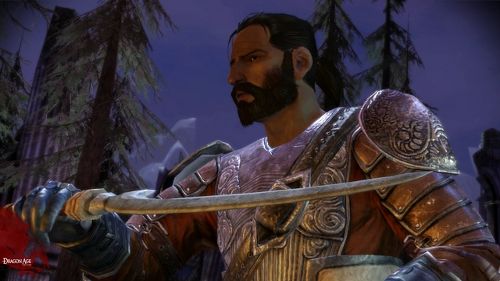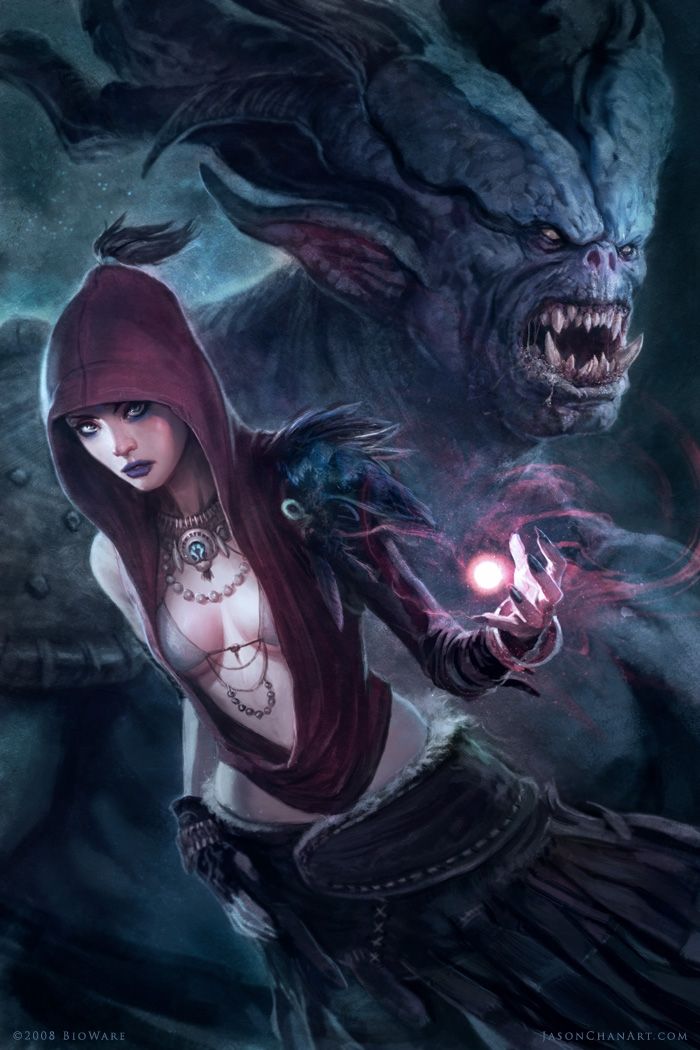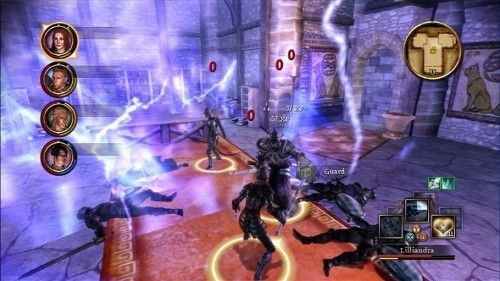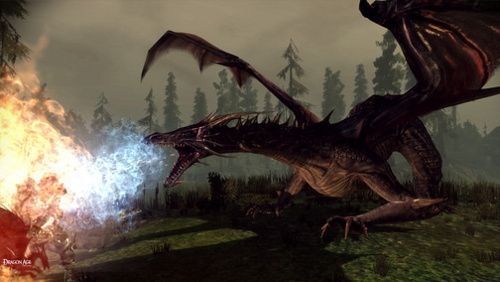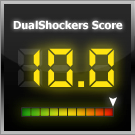To be quite honest, Dragon Age: Origins wasn't quite what I expected. I'm not one to pour over every piece of information hand-fed to us by Bioware before the game's release, so I didn't really know every little aspect to what the game was supposed to be. All I knew was it is an RPG, set in a medieval fantasy world and there are dragons. Actually, Bioware had me at dragons, they were smart to put that in the title. Needless to say, I think I was expecting more of an Oblivion feel. That aside, the unexpected can sometimes be just what is needed.
I'm not going to lie to you, DA:O doesn't really break much new ground. Those familiar with Bioware games of the past will likely feel right at home here. The story isn't terribly original, either, but it is exciting and presented in a thematically intense manner. In other words, the narrative draws you in with the way it's presented - the music, the camera angles, the visual style. While not the most graphically impressive game, DA:O succeeds in immersing you in this high-fantasy world, wrapping you in its warm blanket, making you never want to leave. Usually if a game isn't up to current generations standards graphically, it gets ripped to pieces. You know what? You likely won't care. I struggled at trying to come up with a way to explain why, exactly, you won't care about the low textures and mildly stiff character animations and I think this says it the best: The graphics take a back seat to this thematically impressive, intricate story and believable characters. Bioware never focused on the visuals while advertising this title. It was always sold on its more thematic elements and that is what I chose to focus on, but felt I had to address the graphics aspect, which some gamers and reviewers had issues with.
Along with the narrative, the characters are also wonderfully diverse within the game's lore. Sure, you have your cliché knight in shining armor, your arguably evil mage, your assassin, etc. But, the character dialog and the way they're integrated into the lore of Dragon Age make them unique, each in their own special way. This is helped, in no small part, by the outstanding voice acting. I give props to Bioware for securing some top notch talent like Claudia Black, Kate Mulgrew and Tim Curry. This is how voice acting in a game should be - it should draw you into the game world, not detract from it.
The story of the game revolves around defeating a Blight - a resurgence of Darkspawn lead by an Archdemon. A group of specialized soldiers called the Grey Wardens are tasked to defeat the Blight every time one crops up, and now your main character joins their ranks to pursue this ultimate goal. Along the way there is just as much political maneuvering and intrigue as there is action-packed combat, but it all melds together nicely to form an epic story that involves strong themes like courage, betrayal and loyalty. If you so choose, you can add love to the mixture, assuming you decide to pursue a relationship with one of your companions. There are scenes that really hit hard emotionally, especially when they leave a weighty decision up to you and you have to deal with whatever consequences come your way because of it. Because there are so many choices that affect the main story, the characters' attitude and actions or the dialog, Dragon Age: Origins lends itself to much replayability. This isn't to mention the several endings to the story and the many origin stories based on the race, class and background you pick for your character when you make it.
Throughout the story there are also a plethora of side quests you can partake in - most are optional, but tend to reward you with loads of experience, boosts in party member approval and a lot of good gear to find. What I also enjoyed were the companion quests - each one of your companions has a personal quest you can undertake when that companion thinks highly of you. I enjoyed these the most, as they flesh out a small part of that party member's back-story and involve you more in the game world.
Now, the crux of the matter - game play. As I played through the first several hours, I came to one conclusion: If Final Fantasy XII and Oblivion had a secret love child, this would be it. You have the dark fantasy world, intense story and malleable character customization of Oblivion combined with party-based, action-oriented, pausable combat and tactics system of Final Fantasy XII. What could get better than that, right?
The party-based combat does take some getting used to, but the game eases you into it nicely. You have a four-person party, where you control one character at all times. However, you can switch between characters at will and micromanage them by assigning them different tasks via the intuitive radial menu. You can also queue up one action for each character while the game is paused and watch them play that out immediately when you resume the action. The game's tactics system is a way that you can very specifically define what computer-controlled characters do and the priority with which they perform various actions. For example, you can tell your healer to heal any party member that is below 50% health, or you can tell your main tank to use an item to recover health when his health drops below 60%. This is just scratching the surface.
One of my favorite tactics to set up was to have Morrigan, my main party mage, cast a spell called Mind Blast when two or more enemies got close to her - this would, in turn, stun those enemies and give myself a chance to protect her (this was a default tactic, but I added it to my customized set of tactics because it was so handy). You can also tell your tank to pick up any mob attacking a specific character, so you can automatically pick up mobs that might be hitting your less armored party members like healers. As you play, you'll get used to the flow of combat - knowing just when to micro-manage and when to let the computer do the dirty work. The game provides all the tools you need to be able to control your party to take out any foe that steps in the way.
Character progression is also nicely laid out. Every level you get attribute points and various types of skill points to use. Attribute points add directly to a character's stats, such as strength, dexterity, cunning and magic. Skill points come in three varieties. You have points you can use for secondary skills such as herbalism, trap-making, coercion or increasing the number of tactics slots a certain character has. Next, you have points that are used to give the character new abilities, which can be active, passive or sustained abilities, but all define what type of character you want that one to become. My only issue here - and it is a minor one - is that many of the abilities don't have the best descriptions on them, so it's hard to understand exactly what something does without spending a point on it and using it to see first-hand. Of course, with no mechanic to re-distribute your points, you're stuck with it even if you don't like it.
Finally, we have your specialization points, which you get at levels seven and fourteen. Each character can have two specializations - with pre-defined story characters coming equipped with one when they join your quest. Specializations are various aspects of the main class that enhance your character's abilities and propel them in a direction you want. For example, a rogue's available specializations are Assassin, Bard, Ranger and Duelist. These must be unlocked within the game before you can assign them to your character at the aforementioned levels. Some are unlocked by learning them from your companions when they like you enough, some from various optional quests throughout the game, some from story-related elements and some can be purchased as skill books from vendors. Once a specialization is unlocked for use, you have it open from the get-go on subsequent play-throughs, since it's attached to your profile instead of that particular game save.
In addition to all that, there is ample armor, weapons and accessories to be found in every nook and cranny of Ferelden, which allow you to further customize your character. Do you have a mage specializing in frost spell usage? Find some robes and weapons that increase that damage. Going up against a fire-breathing dragon? Find a set of heavy armor for your tank to wear that has fire resistance. You can also further customize various pieces of gear by enchanting it with runes, adding properties that the armor or weapon might not have natively. All this adds to some serious customization. You can mold your main character to be just about anything you want.
Although, keep in mind that the nature of these types of games means that some classes and specializations might be more robust than others. I played through the game as a rogue focused on ranged combat and, while I definitely had fun, I found that the abilities for that specific type of character weren't as diverse or plentiful as a mage or warrior focused on dishing out damage. (Note: You can use your companions almost full-time in combat if you wish to try out different class play styles, and I did this in many situations, usually controlling one of the two mages I brought along constantly - a frost damage mage [Morrigan] and a healer [Wynne].)
The few issues I had with the game are fairly minor and, to be honest, didn't detract from my overall enjoyment. It is disheartening to pass up so many locked doors or treasure chests because I don't have a rogue with that skill in my party. This was especially noticeable when I played through the human noble origin story as a warrior, and almost every door and chest in the castle you start in is locked. What is that all about? Also, inventory space is an issue. You start out with what first appears to be a generous amount, but it gets eaten up very fast, especially if you're in the habit of just hitting the "Take All" button whenever you loot something. You can expand this by purchasing backpacks from various vendors, but I still always managed to run out of room half way through whatever main quest I was on. This is alleviated somewhat by the Warden's Keep DLC, which adds a near bottomless party chest to keep all your excess belongings in - but that still doesn't help you when you're waist-deep in darkspawn in the middle of a dungeon somewhere and run out of room in your backpack.
I mentioned earlier about the lack of specific descriptions for spells and abilities, as well as no option to re-distribute your skill points - this is an annoyance but not a huge issue since it's unlikely you can screw up your character enough so that you're incapable of finishing the story. And, finally, I will note that some of the dialog seemed…off. Without giving anything away, near the end of the game there are some major decisions you have to make which, I assume, affect the ending elements of the game. I made my decisions, yet as I spoke to various characters, even during main story dialog sequences, the dialog referenced a decision I didn't make as if it was the one I actually did make, and it confused me for a bit. I actually thought I made a mistake in my earlier dialog choices, but no, at the end of the game my decision was still intact - it just appears the dialog was off.
All the minor issues aside, this was an amazing game. The story, the characters and the choices I made are something I will remember for a long time to come, and that is a testament to the outstanding team at Bioware that created this work of art. I spent just under 50 hours playing through the game once (not counting the other two origin stories I played through just for kicks), and I still didn't finish everything there is to do. I'm also still not tired of the game, I want to play it again, experiencing different choices and consequences, using different party members and experimenting with different aspects of the game. In the end, I came, I saw, I was amazed and I conquered. This is a role-playing masterpiece that every gamer should experience.
-
Title: Dragon Age: Origins (Xbox 360)
- Developer: Bioware
- Publisher: EA
- MSRP: $59.99
- Release Date: 11/3/2009
- Review Copy Info: A copy of this game was provided to DualShockers Inc. by the publisher for the purpose of this review.

